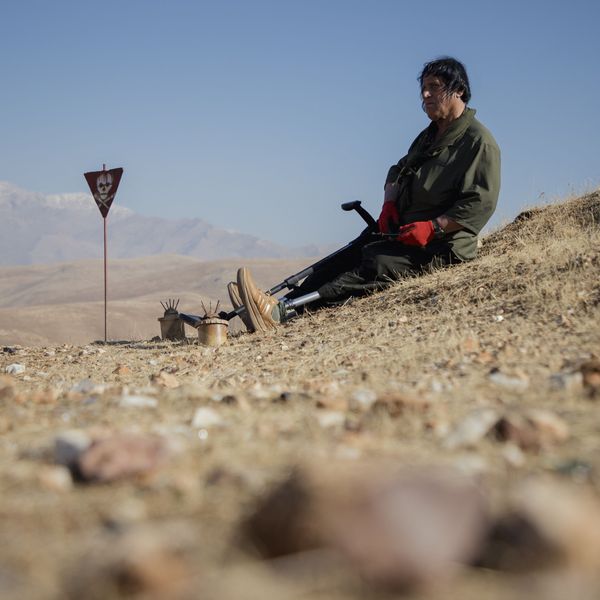
Landmine victims and government officials take part in a march for the banning of landmines as part of the Siem Reap-Angkor Summit on a Mine Free World, in Siem Reap province, Cambodia on November 24, 2024.
As US Approves Landmines for Ukraine, Victims Demand 'Mine-Free World' at Global Summit
"Every landmine planted is a child, a civilian, a woman, who is just waiting for their legs to be blown off, for his life to be taken," said one survivor who lost a leg to a landmine in 2005.
"Look what anti-personnel landmines will do to your people," read a sign displayed by two of the protesters who gathered in Siem Reap, Cambodia this week to confront delegates at a conference on the Anti-Personnel Mine Ban Treaty.
The people holding the sign were among those who took part in the demonstration while using wheelchairs or crutches due to the amputations and serious injuries they have suffered from landmine attacks.
More than 100 people lined a walkway leading to the conference venue on Sunday as the Siem Reap-Angkor Summit on a Mine-Free World opened.
The conference began days after the Biden administration announced a reversal of its own policy and approved a plan to provide anti-personnel landmines to Ukraine—a decision that was condemned by the International Campaign to Ban Landmines (ICBL) and other human rights groups.
As Amnesty International USA advocacy direct Ben Linden said last week, the weapons are "inherently indiscriminate" because they cause explosives to scatter across a wide region, putting people at risk long after conflicts end. The majority of landmine victims are children.
In 2023, at least 5,757 people were killed or maimed by landmines, 84% of whom were civilians. Over one-third were children.
Alex Munyambabazi, who lost a leg to a landmine in 2005 in Uganda, was among those who assembled at the landmines summit.
"We don't want to see any more victims like me, we don't want to see any more suffering," he told Agence France-Presse (AFP). "Every landmine planted is a child, a civilian, a woman, who is just waiting for their legs to be blown off, for his life to be taken. I am here to say we don't want any more victims. No excuses, no exceptions."
The U.S. and Russia are not signatories to the Convention on the Prohibition of the Use, Stockpiling, Production, and Transfer of Anti-Personnel Mines and on Their Destruction, but Ukraine is. According to U.S. Defense Secretary Lloyd Austin, Ukraine "asked" for anti-personnel landmines.
Tamar Gabelnick, director of ICBL, told AFP that Ukraine's use of U.S.-supplied landmines would signify a "blatant disregard for their obligations under the mine ban treaty."
Ukrainian delegates were present at the Siem Reap conference this week.
In a message delivered to delegates in Siem Reap, United Nations Secretary-General António Guterres acknowledged the "important progress" made by the treaty, "with over 55 million anti-personnel devices destroyed across 13,000 square kilometers in over 60 countries, and thousands of people receiving lifesaving awareness education and victim assistance services."
"I call on states parties to meet their obligations and ensure compliance to the convention, while addressing humanitarian and developmental impacts through financial and technical support," he said. " I also encourage all states that have not yet acceded to the convention to join the 164 that have done so."
"A world without anti-personnel mines is not just possible," Guterres said. "It is within reach."
An Urgent Message From Our Co-Founder
Dear Common Dreams reader, The U.S. is on a fast track to authoritarianism like nothing I've ever seen. Meanwhile, corporate news outlets are utterly capitulating to Trump, twisting their coverage to avoid drawing his ire while lining up to stuff cash in his pockets. That's why I believe that Common Dreams is doing the best and most consequential reporting that we've ever done. Our small but mighty team is a progressive reporting powerhouse, covering the news every day that the corporate media never will. Our mission has always been simple: To inform. To inspire. And to ignite change for the common good. Now here's the key piece that I want all our readers to understand: None of this would be possible without your financial support. That's not just some fundraising cliche. It's the absolute and literal truth. We don't accept corporate advertising and never will. We don't have a paywall because we don't think people should be blocked from critical news based on their ability to pay. Everything we do is funded by the donations of readers like you. Will you donate now to help power the nonprofit, independent reporting of Common Dreams? Thank you for being a vital member of our community. Together, we can keep independent journalism alive when it’s needed most. - Craig Brown, Co-founder |
"Look what anti-personnel landmines will do to your people," read a sign displayed by two of the protesters who gathered in Siem Reap, Cambodia this week to confront delegates at a conference on the Anti-Personnel Mine Ban Treaty.
The people holding the sign were among those who took part in the demonstration while using wheelchairs or crutches due to the amputations and serious injuries they have suffered from landmine attacks.
More than 100 people lined a walkway leading to the conference venue on Sunday as the Siem Reap-Angkor Summit on a Mine-Free World opened.
The conference began days after the Biden administration announced a reversal of its own policy and approved a plan to provide anti-personnel landmines to Ukraine—a decision that was condemned by the International Campaign to Ban Landmines (ICBL) and other human rights groups.
As Amnesty International USA advocacy direct Ben Linden said last week, the weapons are "inherently indiscriminate" because they cause explosives to scatter across a wide region, putting people at risk long after conflicts end. The majority of landmine victims are children.
In 2023, at least 5,757 people were killed or maimed by landmines, 84% of whom were civilians. Over one-third were children.
Alex Munyambabazi, who lost a leg to a landmine in 2005 in Uganda, was among those who assembled at the landmines summit.
"We don't want to see any more victims like me, we don't want to see any more suffering," he told Agence France-Presse (AFP). "Every landmine planted is a child, a civilian, a woman, who is just waiting for their legs to be blown off, for his life to be taken. I am here to say we don't want any more victims. No excuses, no exceptions."
The U.S. and Russia are not signatories to the Convention on the Prohibition of the Use, Stockpiling, Production, and Transfer of Anti-Personnel Mines and on Their Destruction, but Ukraine is. According to U.S. Defense Secretary Lloyd Austin, Ukraine "asked" for anti-personnel landmines.
Tamar Gabelnick, director of ICBL, told AFP that Ukraine's use of U.S.-supplied landmines would signify a "blatant disregard for their obligations under the mine ban treaty."
Ukrainian delegates were present at the Siem Reap conference this week.
In a message delivered to delegates in Siem Reap, United Nations Secretary-General António Guterres acknowledged the "important progress" made by the treaty, "with over 55 million anti-personnel devices destroyed across 13,000 square kilometers in over 60 countries, and thousands of people receiving lifesaving awareness education and victim assistance services."
"I call on states parties to meet their obligations and ensure compliance to the convention, while addressing humanitarian and developmental impacts through financial and technical support," he said. " I also encourage all states that have not yet acceded to the convention to join the 164 that have done so."
"A world without anti-personnel mines is not just possible," Guterres said. "It is within reach."
"Look what anti-personnel landmines will do to your people," read a sign displayed by two of the protesters who gathered in Siem Reap, Cambodia this week to confront delegates at a conference on the Anti-Personnel Mine Ban Treaty.
The people holding the sign were among those who took part in the demonstration while using wheelchairs or crutches due to the amputations and serious injuries they have suffered from landmine attacks.
More than 100 people lined a walkway leading to the conference venue on Sunday as the Siem Reap-Angkor Summit on a Mine-Free World opened.
The conference began days after the Biden administration announced a reversal of its own policy and approved a plan to provide anti-personnel landmines to Ukraine—a decision that was condemned by the International Campaign to Ban Landmines (ICBL) and other human rights groups.
As Amnesty International USA advocacy direct Ben Linden said last week, the weapons are "inherently indiscriminate" because they cause explosives to scatter across a wide region, putting people at risk long after conflicts end. The majority of landmine victims are children.
In 2023, at least 5,757 people were killed or maimed by landmines, 84% of whom were civilians. Over one-third were children.
Alex Munyambabazi, who lost a leg to a landmine in 2005 in Uganda, was among those who assembled at the landmines summit.
"We don't want to see any more victims like me, we don't want to see any more suffering," he told Agence France-Presse (AFP). "Every landmine planted is a child, a civilian, a woman, who is just waiting for their legs to be blown off, for his life to be taken. I am here to say we don't want any more victims. No excuses, no exceptions."
The U.S. and Russia are not signatories to the Convention on the Prohibition of the Use, Stockpiling, Production, and Transfer of Anti-Personnel Mines and on Their Destruction, but Ukraine is. According to U.S. Defense Secretary Lloyd Austin, Ukraine "asked" for anti-personnel landmines.
Tamar Gabelnick, director of ICBL, told AFP that Ukraine's use of U.S.-supplied landmines would signify a "blatant disregard for their obligations under the mine ban treaty."
Ukrainian delegates were present at the Siem Reap conference this week.
In a message delivered to delegates in Siem Reap, United Nations Secretary-General António Guterres acknowledged the "important progress" made by the treaty, "with over 55 million anti-personnel devices destroyed across 13,000 square kilometers in over 60 countries, and thousands of people receiving lifesaving awareness education and victim assistance services."
"I call on states parties to meet their obligations and ensure compliance to the convention, while addressing humanitarian and developmental impacts through financial and technical support," he said. " I also encourage all states that have not yet acceded to the convention to join the 164 that have done so."
"A world without anti-personnel mines is not just possible," Guterres said. "It is within reach."

